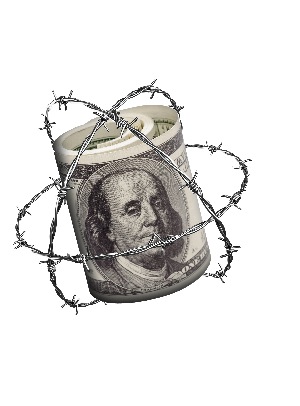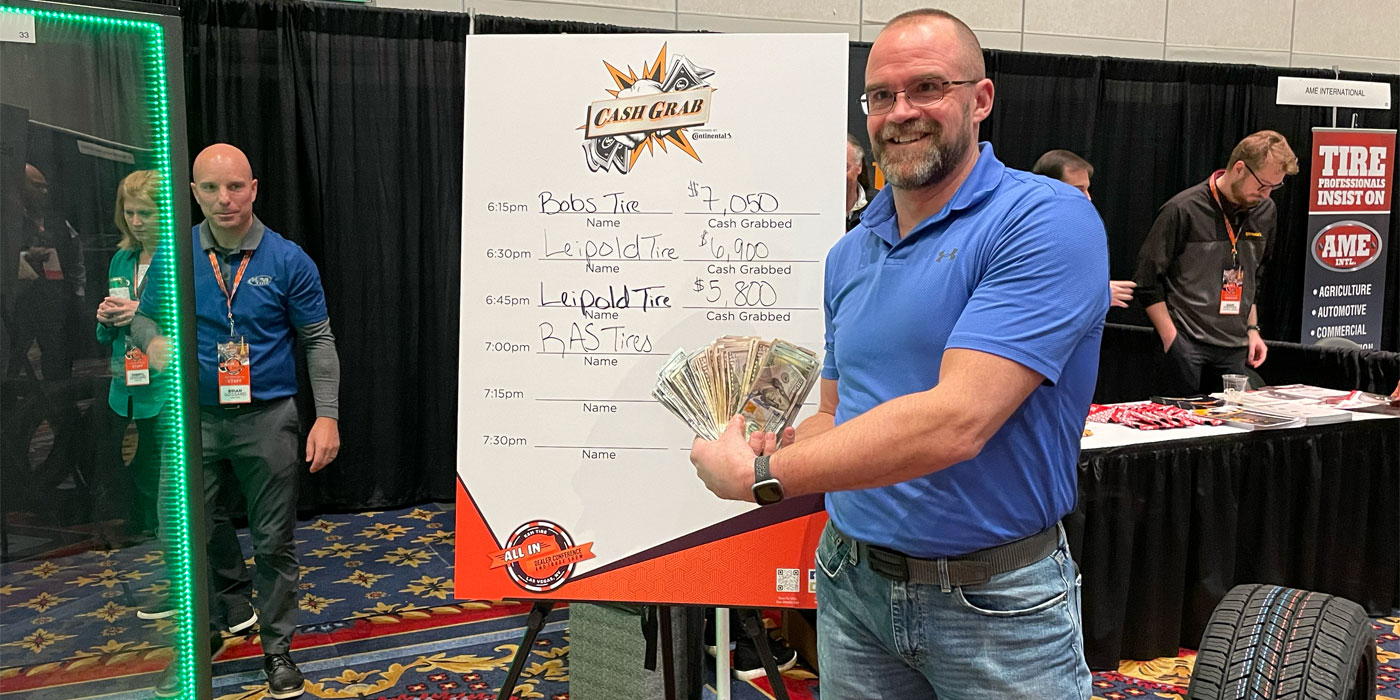 Profitability increases the value of your company and provides the capital you need to invest in growing your operations. It should be your most critical point of focus.
Profitability increases the value of your company and provides the capital you need to invest in growing your operations. It should be your most critical point of focus.
But perhaps an even more critical focus for a viable business goes beyond making profits to retaining profits.
Far too many tire dealerships end up operating like a profit sieve. The money flows out pretty much as fast as it flows in, and in the new economy in which we all operate, that is a formula for disaster.
In this article, we will use the umbrella term “loss control” to address the many ways money unintentionally flows out of an organization. Recognizing creative ideas and their subsequent implementation will help any business move from a leaky sieve to a solid dam where any holes are anticipated, recognized and, should they materialize, quickly plugged.
Loss control covers a wide range of ways in which profits leak out of your company. For our purposes here, we will break that term down into two broad categories: leaks from within, and siphons from the outside. The internal leaks can be further broken into intentional and unintentional actions, with the intentional category including theft of tires, parts, supplies and cash. The unintentional acts include carelessness and waste.
Obviously, a large part of loss control is employee theft. Some of you are probably reading this and saying, “My people love working in my shop and they love me. They would never steal from me!” For most of your people, I would totally agree with you, but we now face the most challenging economic times in a generation. When it comes to feeding their family, losing their home or apartment, or taking a little something here and there (often with the intent of replacing it later), survival is a strong force.
As one well-placed tire professional once told me: “If necessity is the mother of invention, then opportunity is the father of theft.” This is true both internally and externally when it comes to controlling losses.
Good Apples, Good Barrel
When it comes to controlling internal losses, there are really two aspects to closing the holes in your profitability dam. The first deals with employees, the people to whom you have given the privilege of becoming a part of your organization. The second addresses the policies and procedures you have in place to reduce the opportunities for theft and waste, and how rapidly and clearly you respond to any violations.
Far too many managers move quickly to fill a hole in their employee roster and unintentionally create a hole in their profitability dam. Tire dealers are far better off than apparel and jewelry retailers, but the latest figures on employee theft from a 2005 University of Florida National Retail Security Survey place employee theft at 47% of store inventory shrinkage. This amounts to about $17.6 billion dollars leaking through retailer profitability dams each year.
A security expert from a large tire manufacturer, who works with dealers to reduce inventory shrinkage and other forms of internal theft, says, “I can’t over-estimate the importance of applicant background checks.” Captain David Tilner, commander of the Criminal Investigation Division of the Collierville (Tenn.) Police Department, emphasizes that business owners must be totally comfortable with each and every person they add to their organization.
So what can you do? Get back to the basics, but with greater intensity.
While former employers are legally limited today in terms of what they can and can’t say, these background checks can still be a useful source of information, at the very least in identifying gaps in employment history that may not match the applicant’s resume. References should also be contacted, and their comments considered in terms of what they don’t say as well as the commendations made.
Electronic checks will not show charges that have been filed against individuals, but they will list convictions. Anyone you employ who will have unsupervised access to your money should also have a credit history run on them, and your application process should ask for their signed approval to conduct such checks.
Once screened and hired, it is critically important that management work to make the new hire feel like they are a valued part of a quality team. Amye Olson, a store manager with Gurnee Tire & Brake in Gurnee, Ill., emphasizes that happy employees do a much better job of controlling losses from both internal and external sources.
“It is important that you be honest with employees and let everyone know what the issues are,” she says. Likewise, it should be made totally clear to employees what the consequences are for any violation. In the March Tire Review article on employee handbooks, this was emphasized as an important component of such a document. Inappropriate behaviors must be clearly tied to consequences, and those consequences must be swiftly and universally enforced – without exception.
Building a Solid Barrel
Even with good, honest and ethical people in your organization, you still must ensure that your policies and procedures help to reduce the opportunity for good people to do bad things. The cornerstone of those policies when it comes to loss control is inventory control.
Norm Jones, owner of Kirkwood Tire Pros in Wilmington, Del., states that, “When your employees know you are regularly counting your inventory, it makes a big difference. Once a year is better than never, but we now do a monthly total tire count. It only takes about 30 minutes, and in addition to watching for shrinkage, it also helps us identify where an invoice might be missing, if there was an error in the receiving process, or worst of all, when the tires that were sold do not match the tires that we installed.”
Dave Crawford at Tire Pros supports this view, and adds there are additional benefits to monitoring inventory. “I recommend that as dealers do their total tire count, they use a large piece of chalk and put a clear mark on each tire, and a marker to do the same with parts boxes. This way when you see a particular item has five or six marks you know it’s not moving. You may be able to trade these tires out with your distributor for ones you are regularly selling.”
With more than 20 stores, Joe Flynn III, owner of Flynn’s Tire in Hermitage, Pa., lives in a world where taking inventory is not an event, but a way of life. “We used to do it once a year, but now each location takes inventory three times each 12 months. The timing is staggered so we simply never stop taking inventory.”
At Flynn’s, regional managers are tasked with inventory control. They have made the important investment to use bar code scanning for their inventories, and the results are reflected in the manager’s income statement and bonus program. “It has helped us to identify problem locations and product categories that the regional managers should focus their time and energy on,” he says.
Bar code technology is something many dealers are looking at, and those who have taken the step feel it has benefits in efficiency and accuracy that go beyond simply improving the precision of an inventory count.
Kirkwood Tire Pros has gone beyond merely counting its items to controlling distribution in the shop. “We knew it was simply a matter of unintentional waste when it came to shop supplies,” Jones says. “We now have a system where all items except nuts and bolts are locked in the parts department. When people want a can of brake cleaner, they must turn in an empty one. When they want clean shop towels, they must turn in soiled ones on a one-for-one basis.”
All the necessary parts and supplies are now attached via a computer print-out to the repair order for each job. Tires also are confined in the storage area, and are pulled based on the ticket by the parts managers. He indicated that this has had a significant impact on waste, failure to charge for items and the accuracy of the work that is being done on customers’ cars.
Besides the theft of tires, parts and supplies, the direct or indirect theft of funds by employees is a particularly damaging profit leak in any dealer’s dam.
Information system procedures should be put in place to send up red flags and alert management to employees who may be stealing from you.
An exceptionally high percentage of no-charge invoices is a warning sign that should at the very least be explored. Customers may be paying with cash, as many are now with the credit crunch, with a no-charge invoice being generated and the cash pocketed. In addition, an extraordinarily low percentage of cash invoices can also be a red flag. These sales may be taking place without an invoice, or being put in the no-charge category. One dealer caught an employee forging a credit card receipt.
For any and all of the above offenses, it is important that the thief be prosecuted to the fullest extent of the law. The dealers we contacted also indicated that it is important to stress the need for all questionable behavior by any employee to be reported to management. In these challenging times, everyone on the team must realize that theft by a colleague could easily put the survival of the organization and each member’s job in jeopardy.
Is Somebody Watching You?
Video camera surveillance is another procedural aspect that many dealers see as central to their loss control efforts. It is one tactic that addresses both internal and external losses.
Olson says that Gurnee Tire & Brake took a very close look at the issue before adding systems to its stores. “We made the investment not only to watch the counter for suspicious activity and keep an eye on what is going on outside the store, but also to ensure that proper procedures are being followed. It may be as simple as verifying that courtesy checks are taking place, or to ensure that customers are not putting themselves in danger by walking around in the shop, or to notice outsiders simply wandering in with no positive purpose.”
Each of Gurnee’s cameras is activated by a motion sensor, with Olson and other managers keeping an eye on the monitor from time to time. Gurnee’s analysis placed the break-even return on the surveillance investment at approximately two years. It has also had the top-line revenue benefit of making customers feel more secure in dropping their cars off before or after store hours.
Flynn’s Tire also has made an investment in a nine-camera system that is linked to a DVR recording system. They have found it to not only be a theft deterrent, but also a valuable customer service training tool.
A security expert from a tire manufacturer cautioned that video surveillance systems can result in a false sense of security if their limitations are not clearly recognized. He indicated that the monitors must be watched regularly and the person doing the viewing must be well-trained in terms of what to look for.
External thieves in many parts of the country are now very used to the cameras, regularly use disguises when in camera view, and are so bold as to actually steal the cameras themselves from time to time. Motion activation is an absolute must from the security expert’s perspective.
Siphoning From the Outside
A fact of life for all retailers today is that your customer may not be who you think he or she is. Detective Mike Fry of the U.S. Secret Service Electronic Crimes Task Force says that he regularly encounters counterfeit IDs that look very legitimate, and only cost $150 on the street. Combined with counterfeit or stolen checks or credit cards, a thief has the tools for identity theft – and what amounts to the theft of your tires, parts and labor.
Det. Fry suggests that dealers, “Always ask for another form of picture identification when accepting a credit card from any customer you don’t personally know. Two forms of ID are an even better means to defend your company against this rapidly growing problem. When doing these checks, make certain the name on every form of ID matches the name on the card or check.”
ID thieves are particularly skilled at getting a conversation going with your employee to get their guard down, he cautions. When surveillance cameras are visible, train your employees to watch out for customers looking down or hiding under the brim of a pulled down cap. Others warn that employees should be wary of customers who don’t seem concerned about the total purchase price of the sale. When you think about it, if the money is not their own, why should they care?
One tip Det. Fry provides to identify counterfeit checks is to use the American Banking Association routing number database to ensure the number on the check matches the name of the bank on the check. Another option is to call the bank and ask for their legitimate routing number. One area of hope is the growing level of cooperation taking place between large retailers today as they share photos of thieves, and post them near terminals. This has helped to solve a growing number of ID theft cases.
Several dealers and manufacturers stress the need for their peers to provide similar cooperation. When any dealer encounters a deal that is simply too good to be true, it almost always is. When something like that happens, it’s important to notify the police immediately and give them as much information as possible. And, if you’re smart, you’ll also contact other independent dealers and company-owned stores in your trade area and give them a heads-up. Someday that phone call could save your business.
Gurnee Tire’s Olson found that her company’s use of the American Car Care Centers credit card has greatly reduced their losses from credit transactions. “We have a small number of problems now, as we direct people to the store card. Some of it was scammers, and in other instances people simply trying to stretch their overdraft protection and float. When we can have them use their ACCC card, this is no longer an issue.”
She also says there is another source of profit loss many dealers can easily overlook. “When drivers pick up your waste oil or take-off tires, ensure they cut you a check at that point in time.” These funds, she says, may never be recovered if this is not done. Olson also cautions that dealers must ensure that these organizations are properly licensed. As we continue to place greater emphasis on the protection of our planet, working with an unlicensed scrap or waste hauler can result in the ultimate loss: being closed by the authorities.
Locking Down on Opportunities
With regard to theft of and from vehicles, Capt. Tilner says the key is to cut down on what he calls “opportunity crimes.”
“It may sound like common sense, but these include unlocked doors and purses,” he says. He emphasizes the need for prompt police contact when a crime has taken place. “The best approach is employee education and always taking steps to reduce a thieve’s opportunity.”
Vigilance is the Strongest Dam
When it comes to controlling losses from the various categories of leaks mentioned here – as well as from others you may have experienced – tire dealers and employees simply must be vigilant. If you let your guard down, if you start to tell yourself it happens to others but it won’t happen to you, you will be easy pickings from internal or external loss sources.
According to Crawford at Tire Pros, “It comes down to doing the basics. Make certain you have alarms on all doors, and they are set when your business is closed. Check any windows to ensure they are locked when you are closing. Walk around inside and outside your business, and hold people accountable for loss-control results.”
If you do these things, you will have a solid profitability dam, your profit reservoir will continue to fill and your overall success will likely go swimmingly. If you fail to adopt best practices, invest in solutions and make the extra effort it takes to control losses, your business will most surely run aground.













